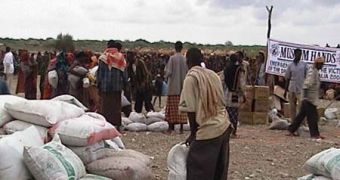All those millions of people in Africa who are suffering and dying from hunger and starvation could benefit from a drastically improved quality of life if officials and international experts advised and supported small scale agriculture, instead of pushing for large agricultural endeavors that are unsustainable in the current conditions, as droughts and floods severely affect multiple African nations.
The United Nations, through its head of Environment Programme, Achim Steiner, expressed its confidence that the famine that is plaguing the poorest continent in the world since decades ago could be eradicated within a matter of years, if small farms were encouraged to grow and prosper, and if basic infrastructure work was done – such as digging irrigations ditches and tall damns, to prevent fields from being overrun by waters.
This could be much more "doable" on a small level than on the industrial scale, resource economists say. The West leaped ahead of other regions on the globe during the "green revolution" of the 1960s, when the food production increased over the demand for the first time in history. Comparatively, nowadays a European or an American benefits from 25 percent more food than they need, while an African has 10 percent less than they had 4 decades ago.
This situation is unacceptable, UN officials say. Political interests and the large Western corporations have kept most poor African nations in a state of servitude, by forcing the large state-run enterprises to purchase genetically-modified (GMO) seeds, which can only be used once. In organic farming, a part of the crop is used for the plantation season of the following year, thus allowing the farmers to keep some profits from their work. GMOs force peasants to buy seeds every year, thus making them vulnerable to increases in price, which may occur whenever a certain company feels like it.
"Organic farming can often lead to polarized views. With some viewing it as a savior and others as a niche product or something of a luxury (...) this report suggests it could make a serious contribution to tackling poverty and food insecurity," added Steiner, who is also a former economist.

 14 DAY TRIAL //
14 DAY TRIAL //